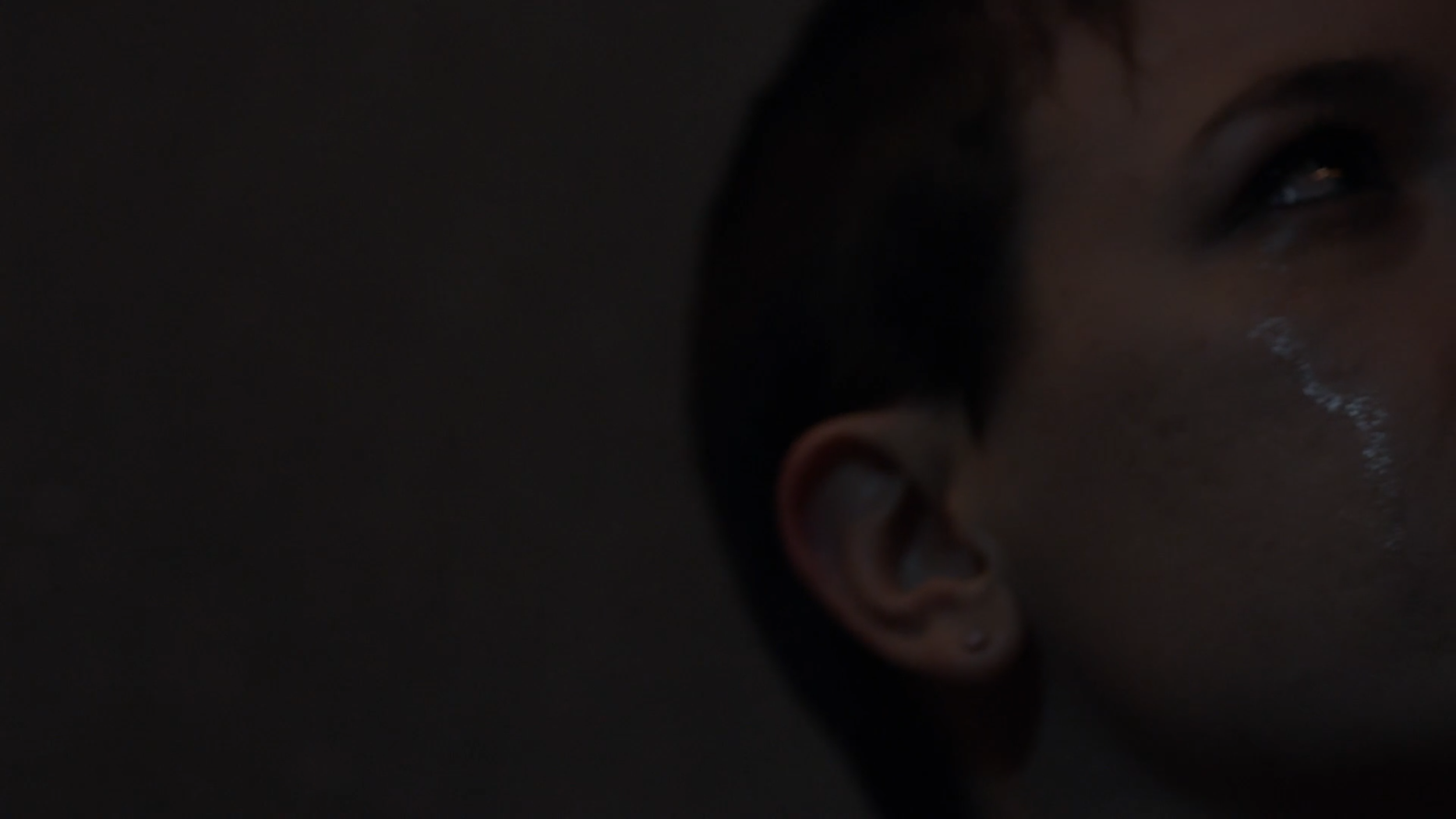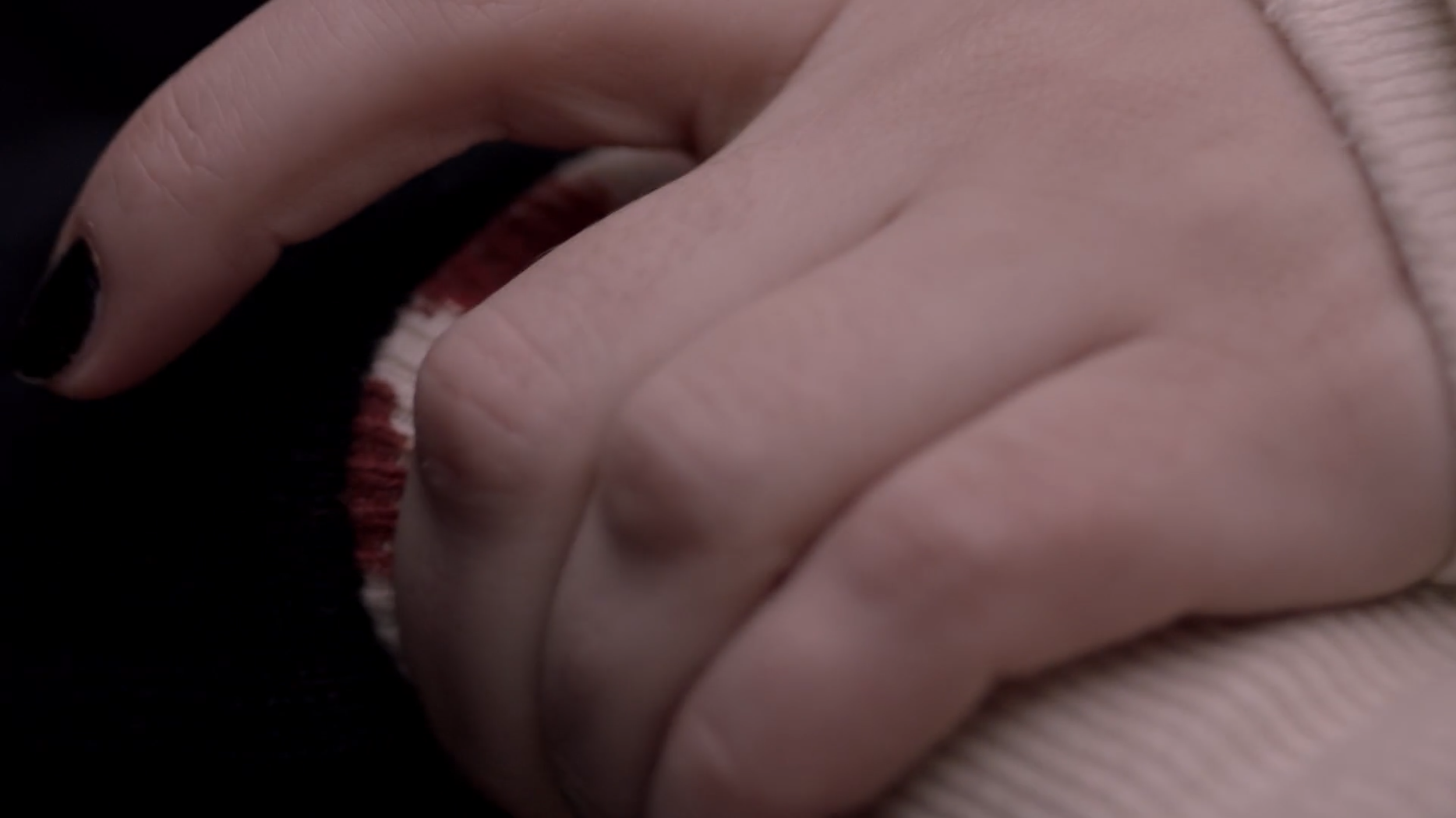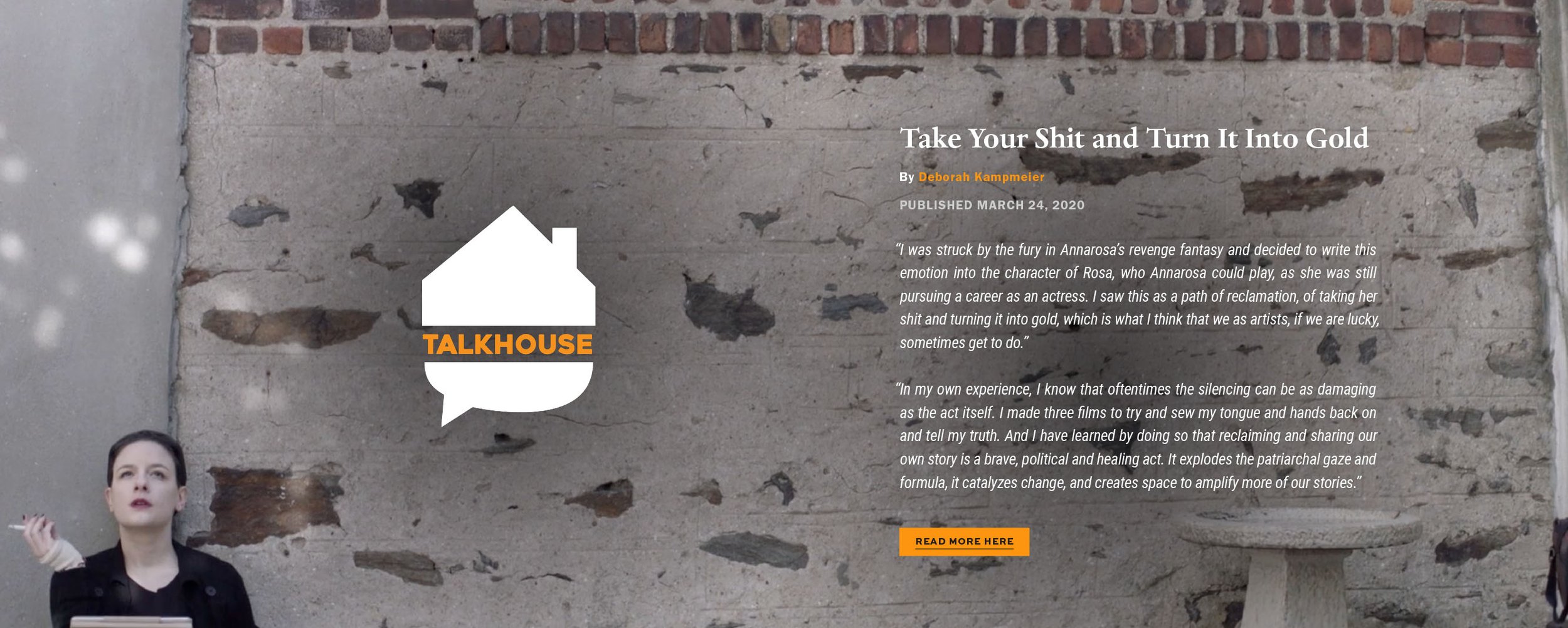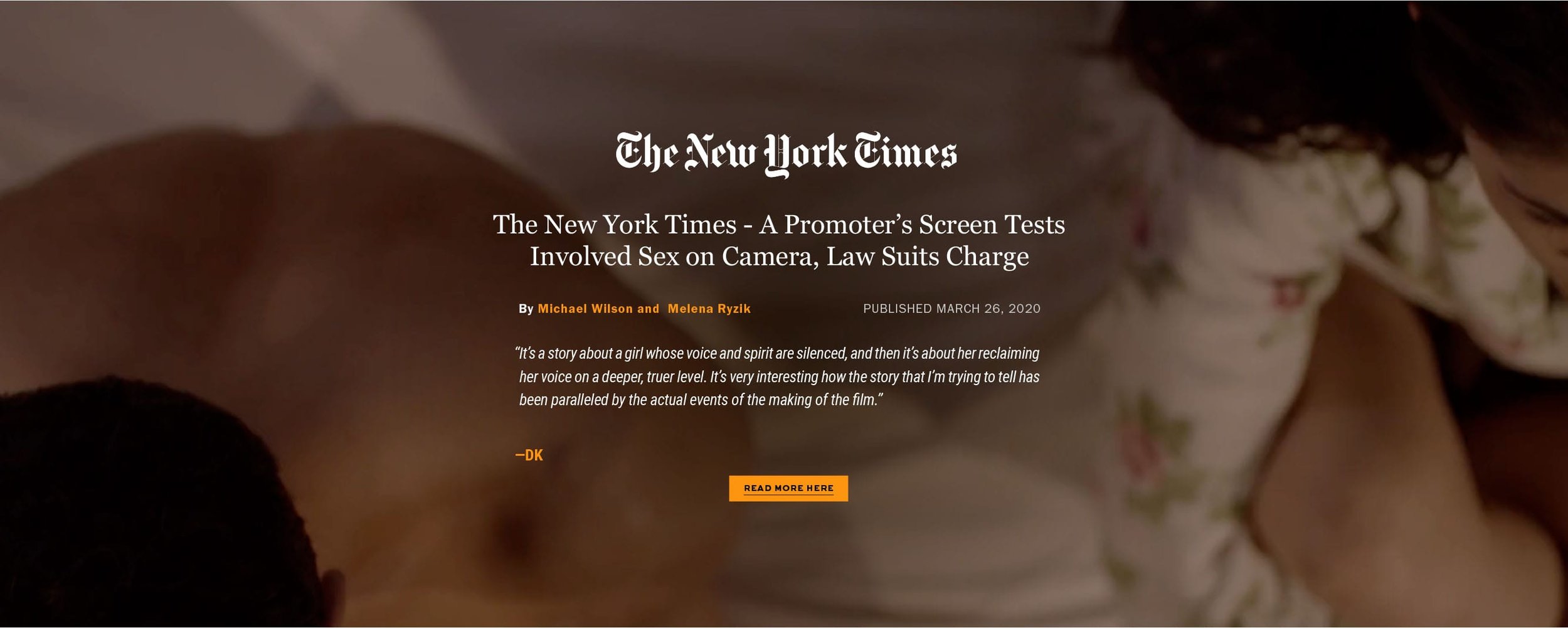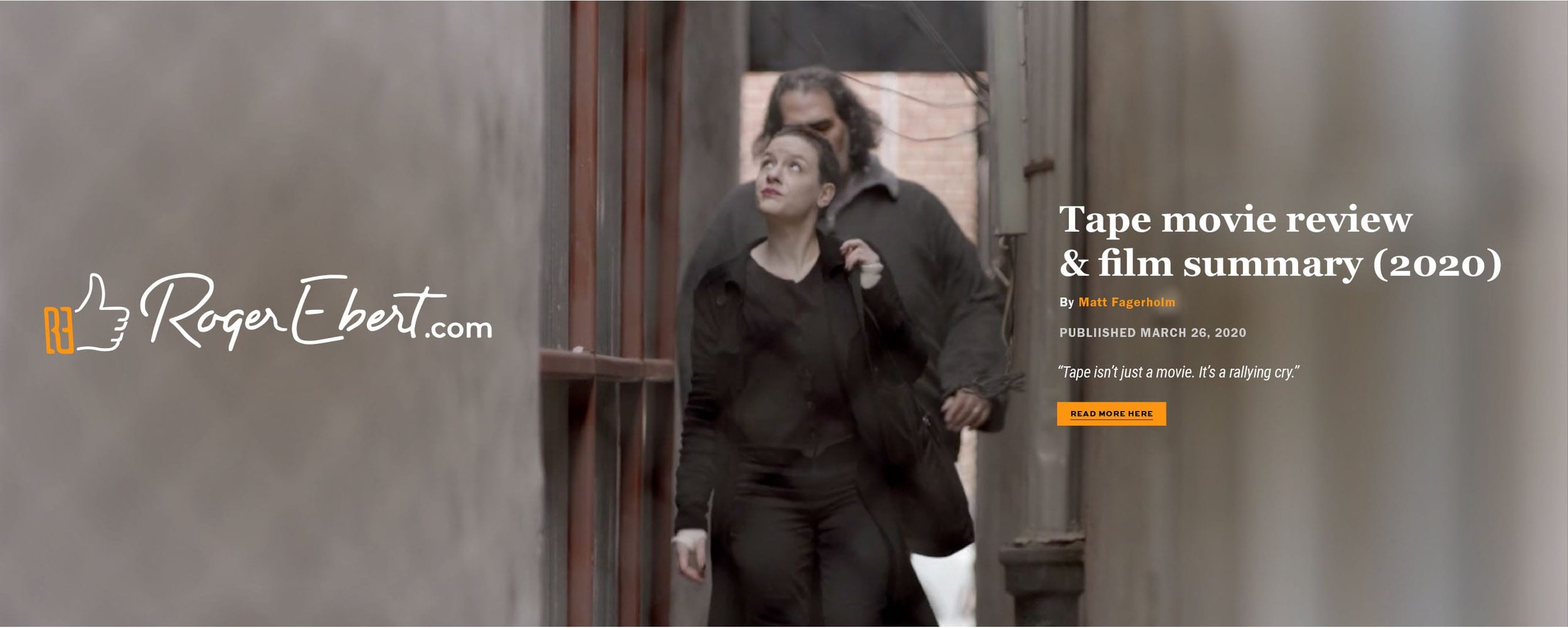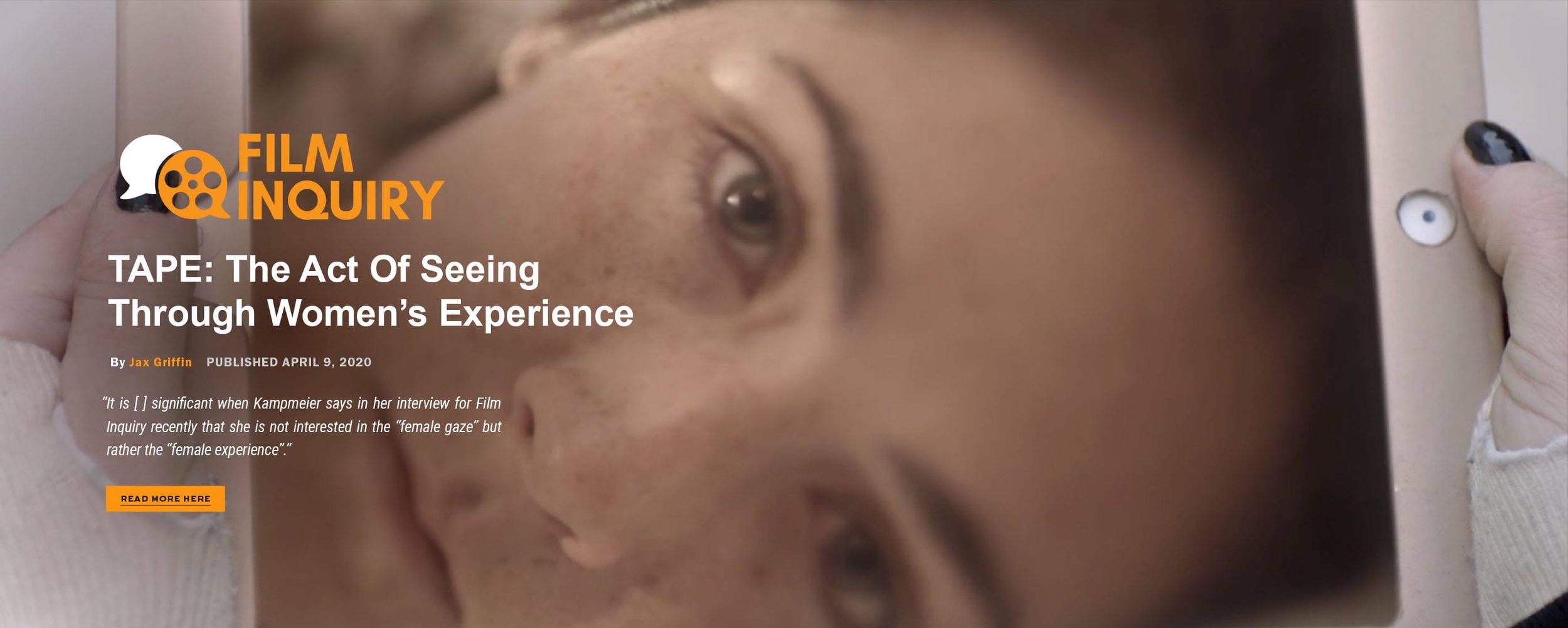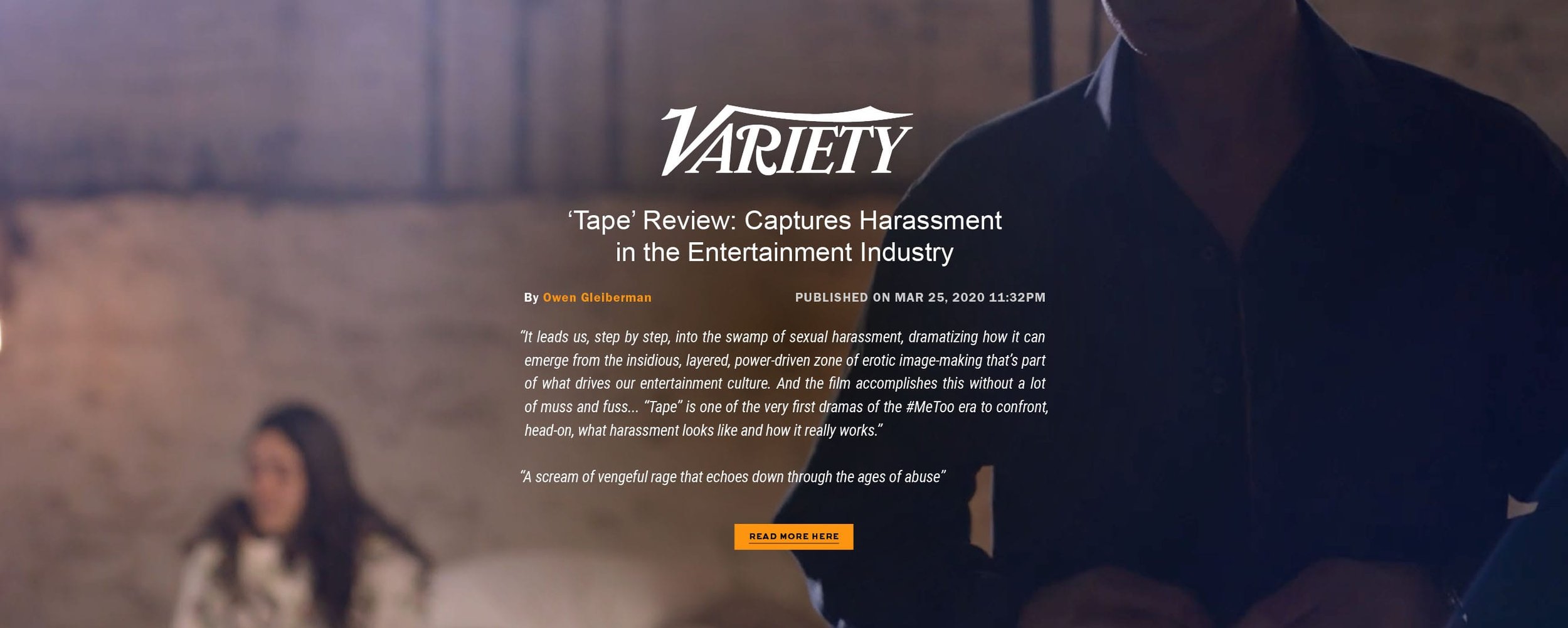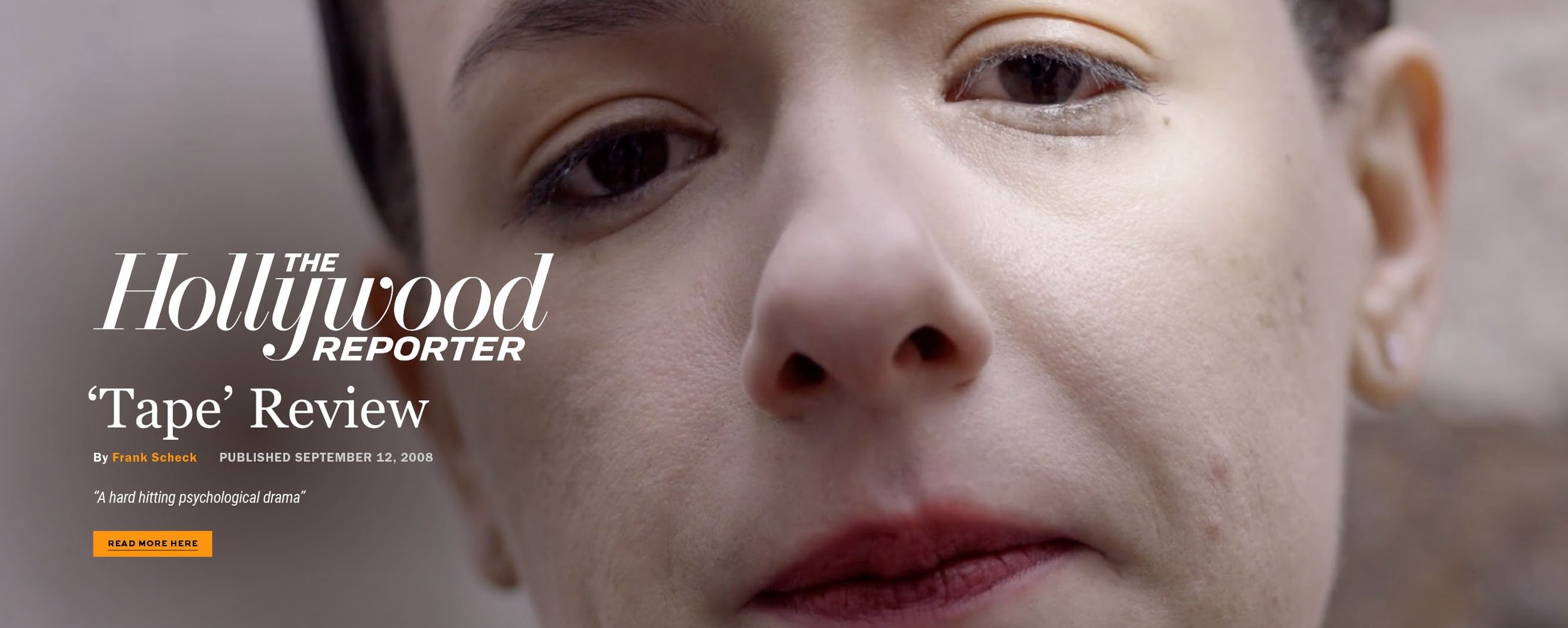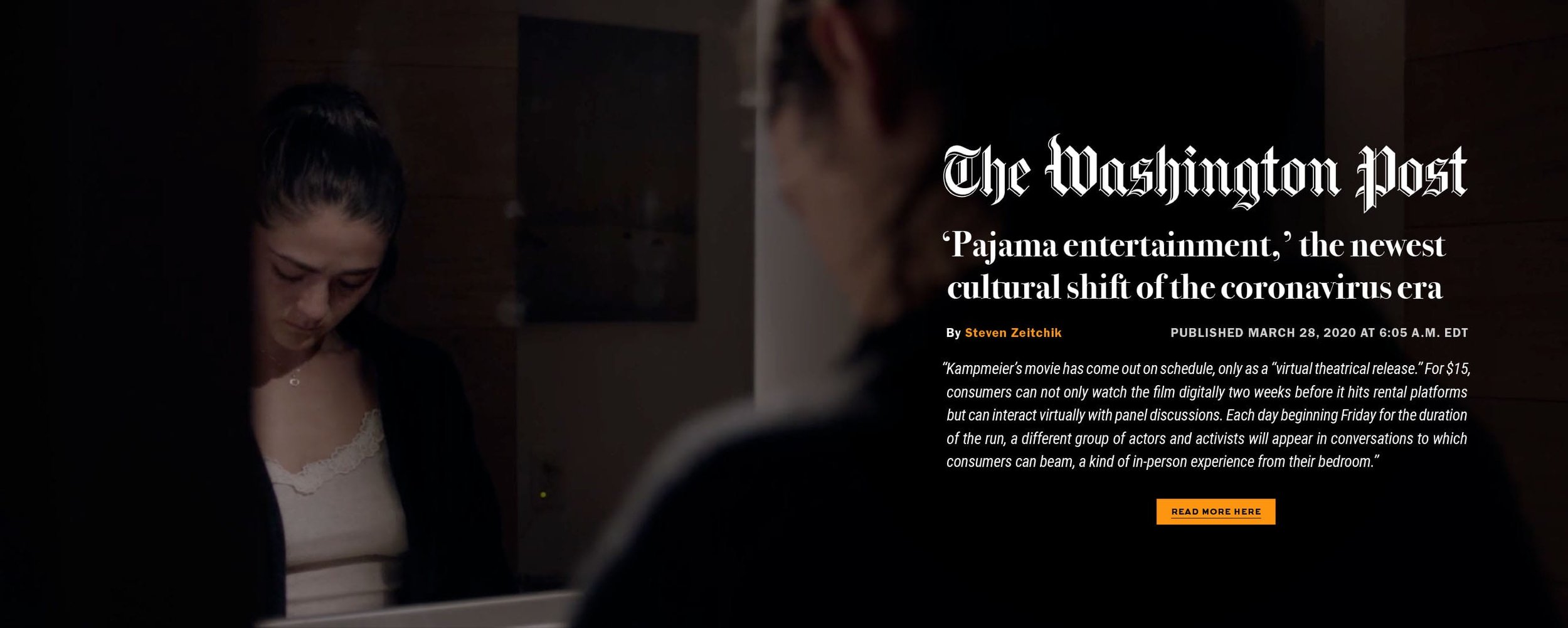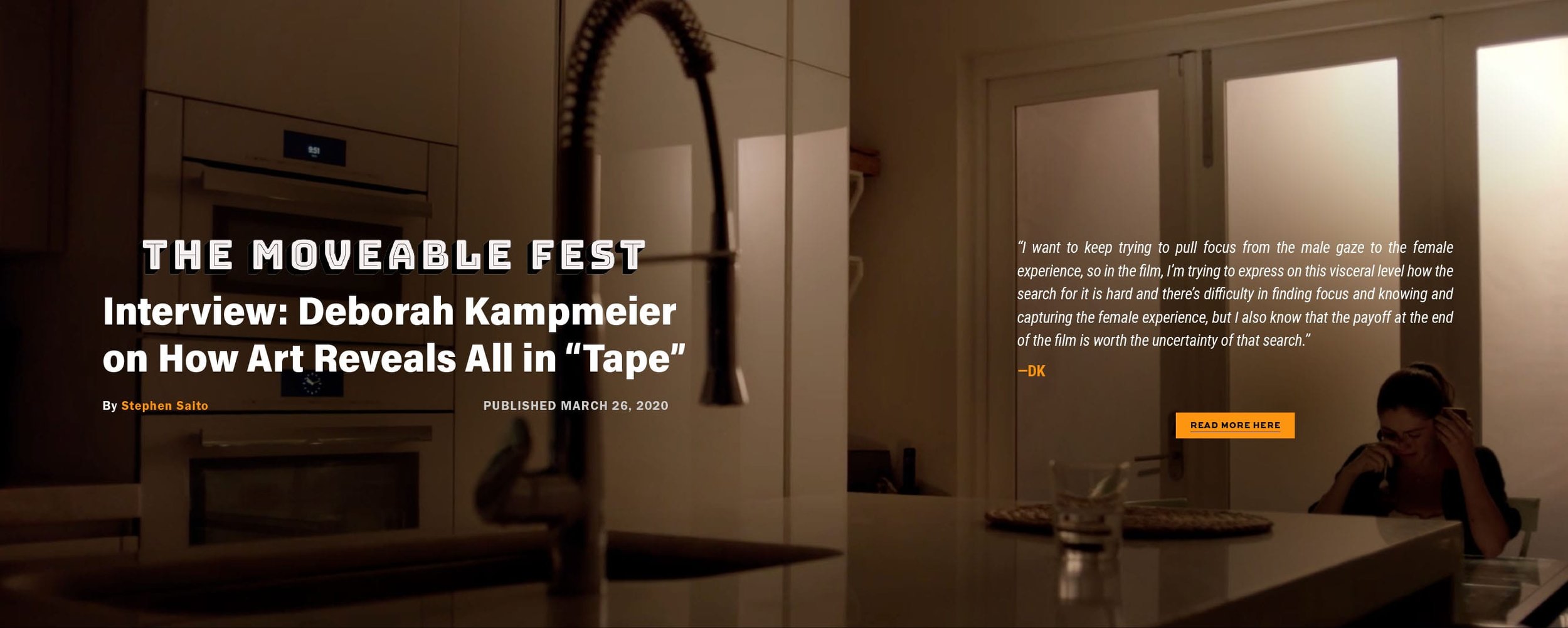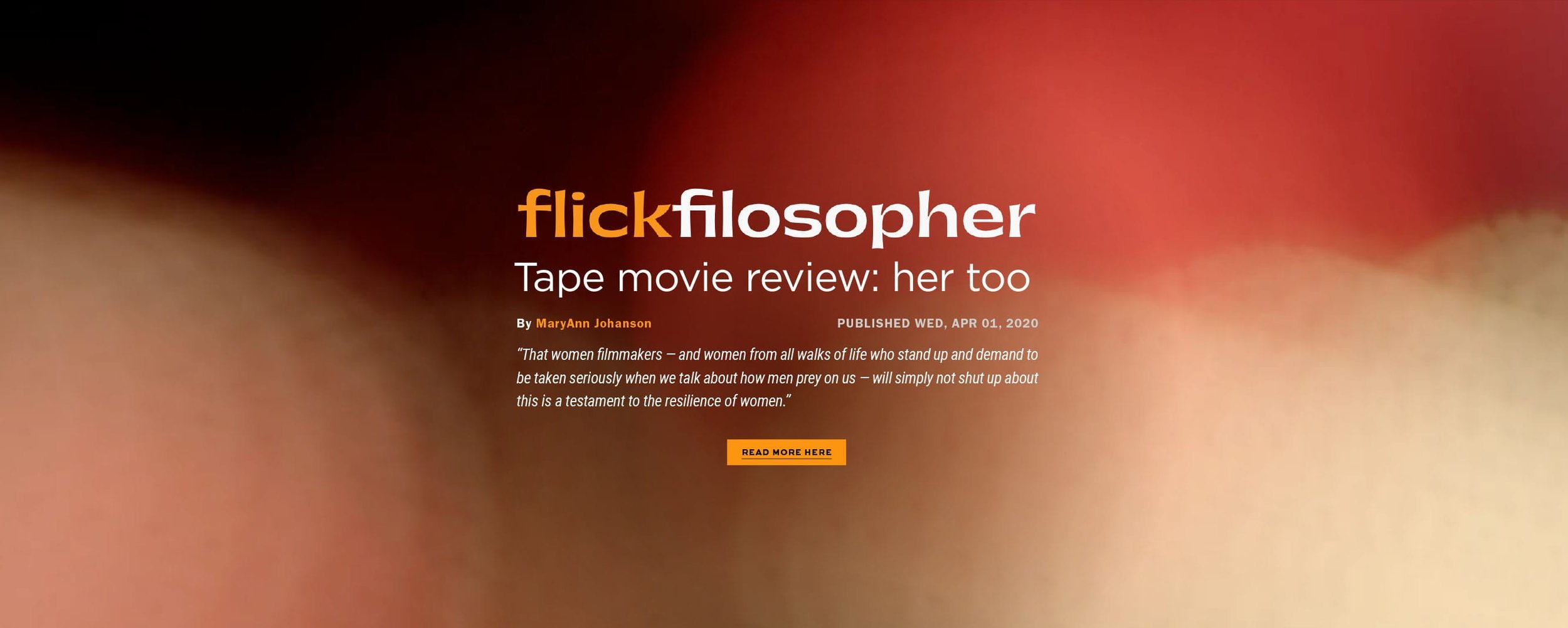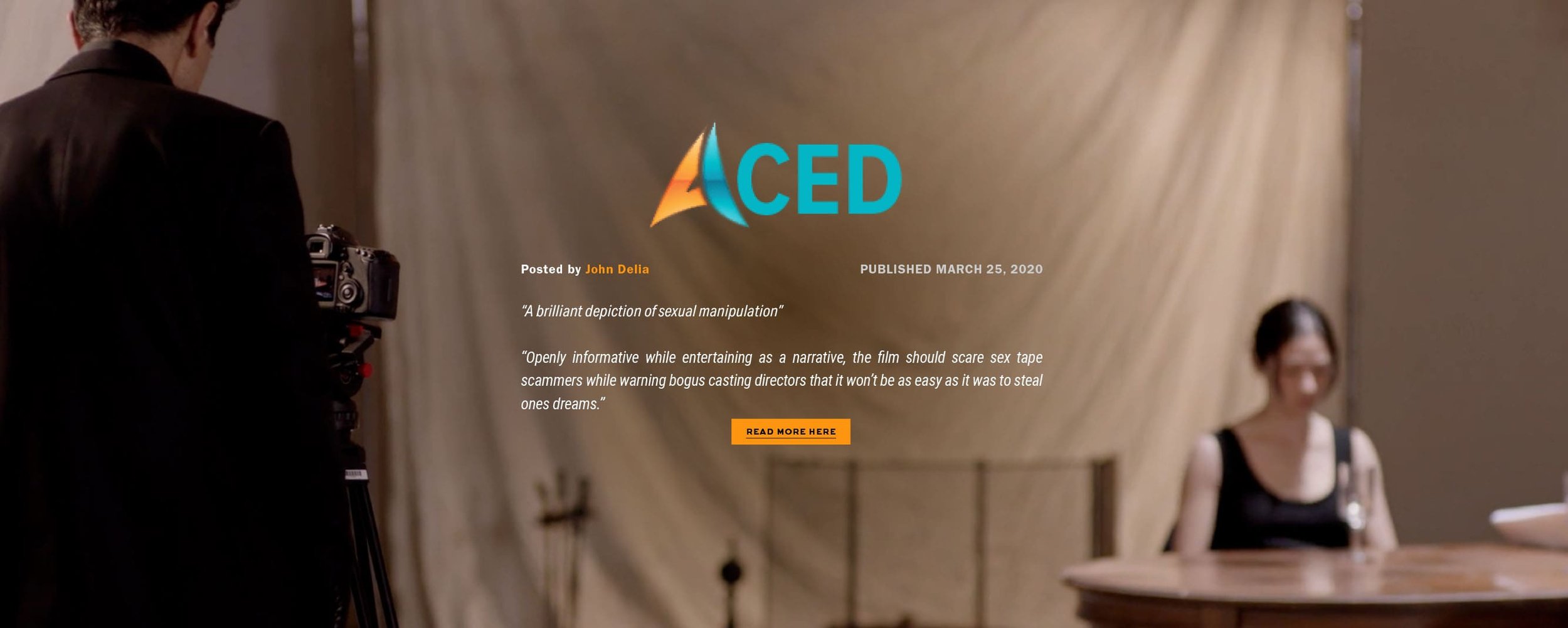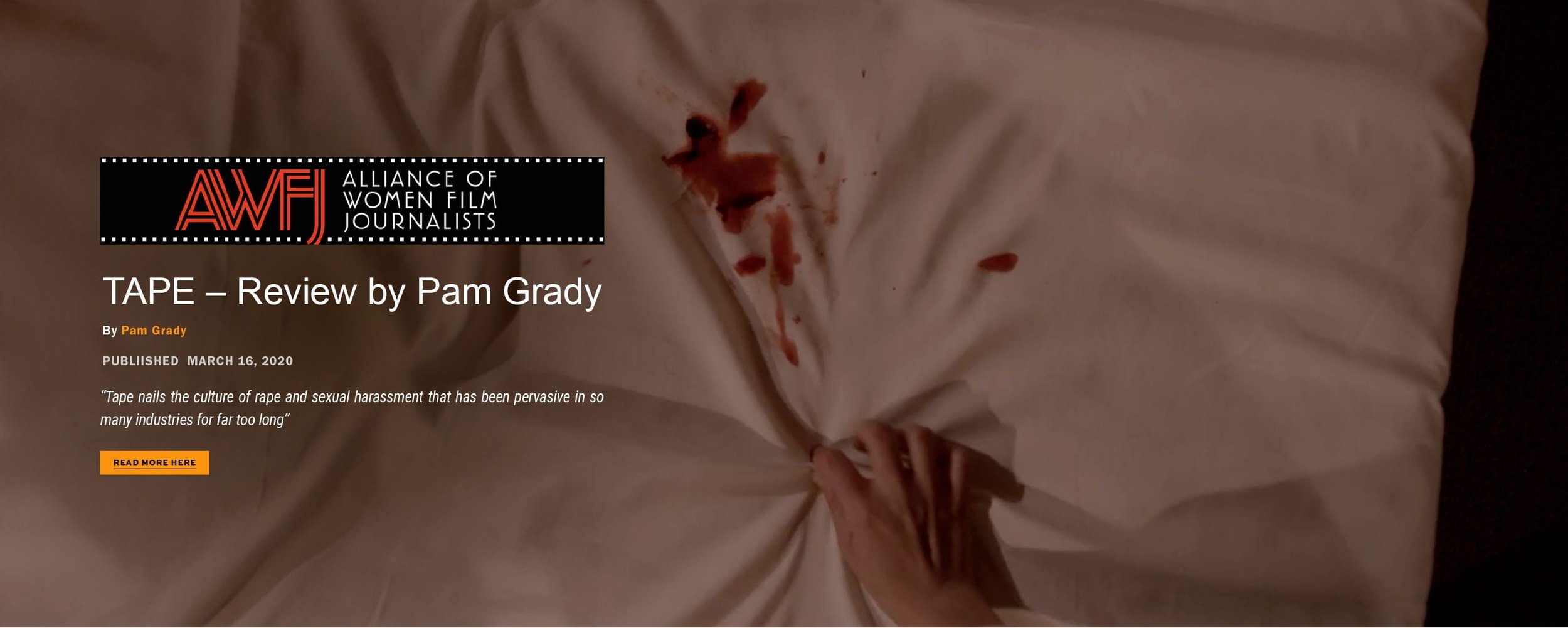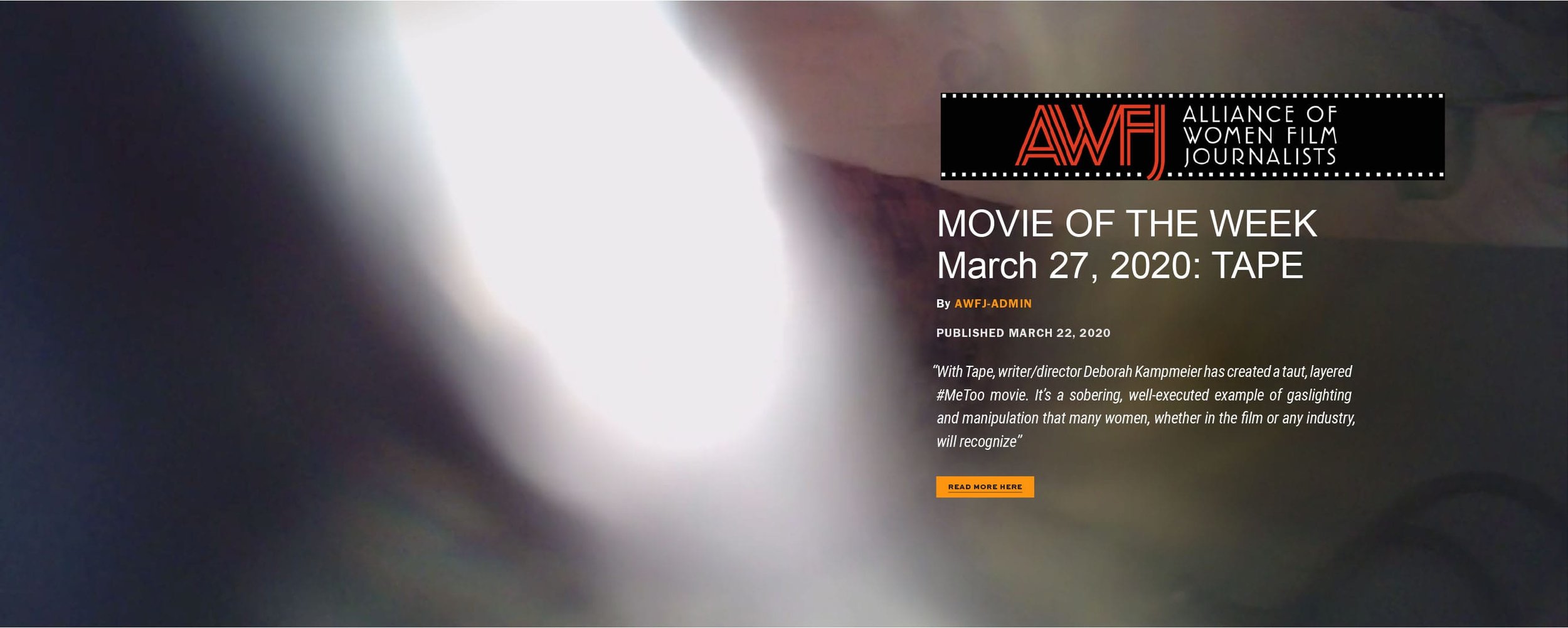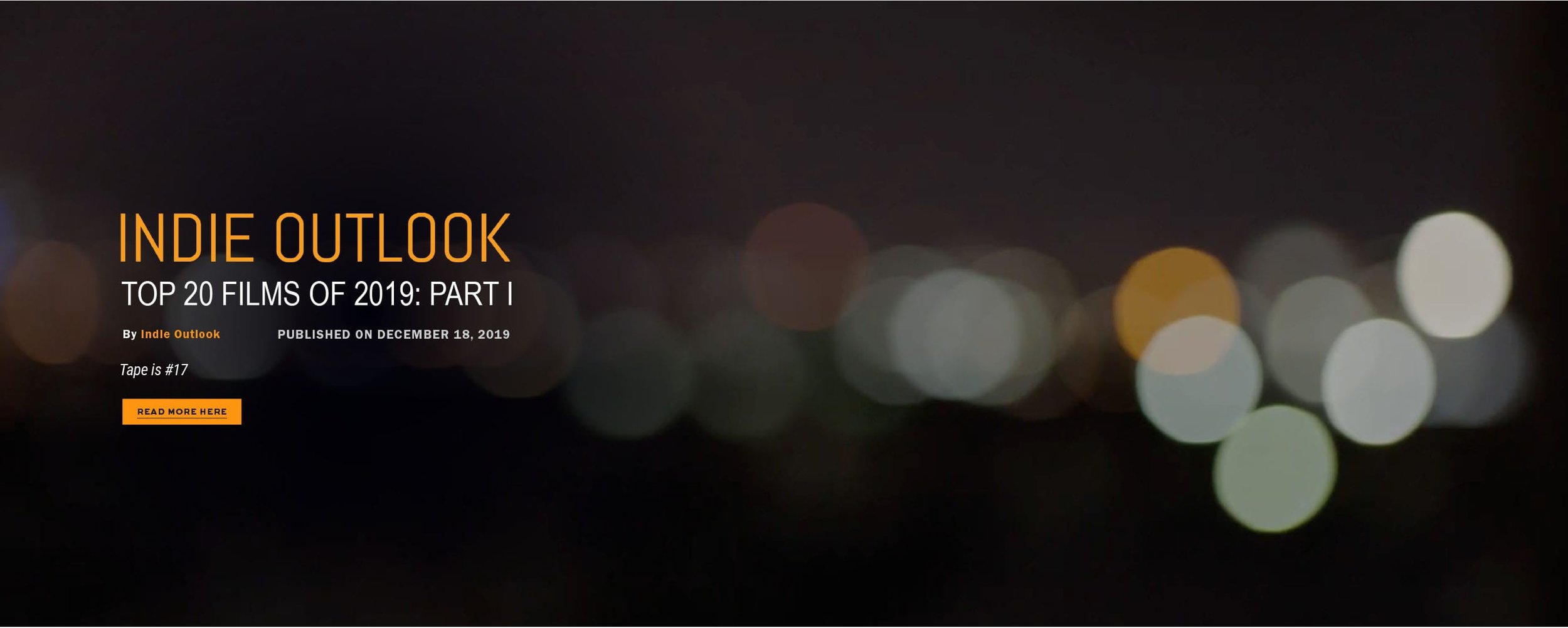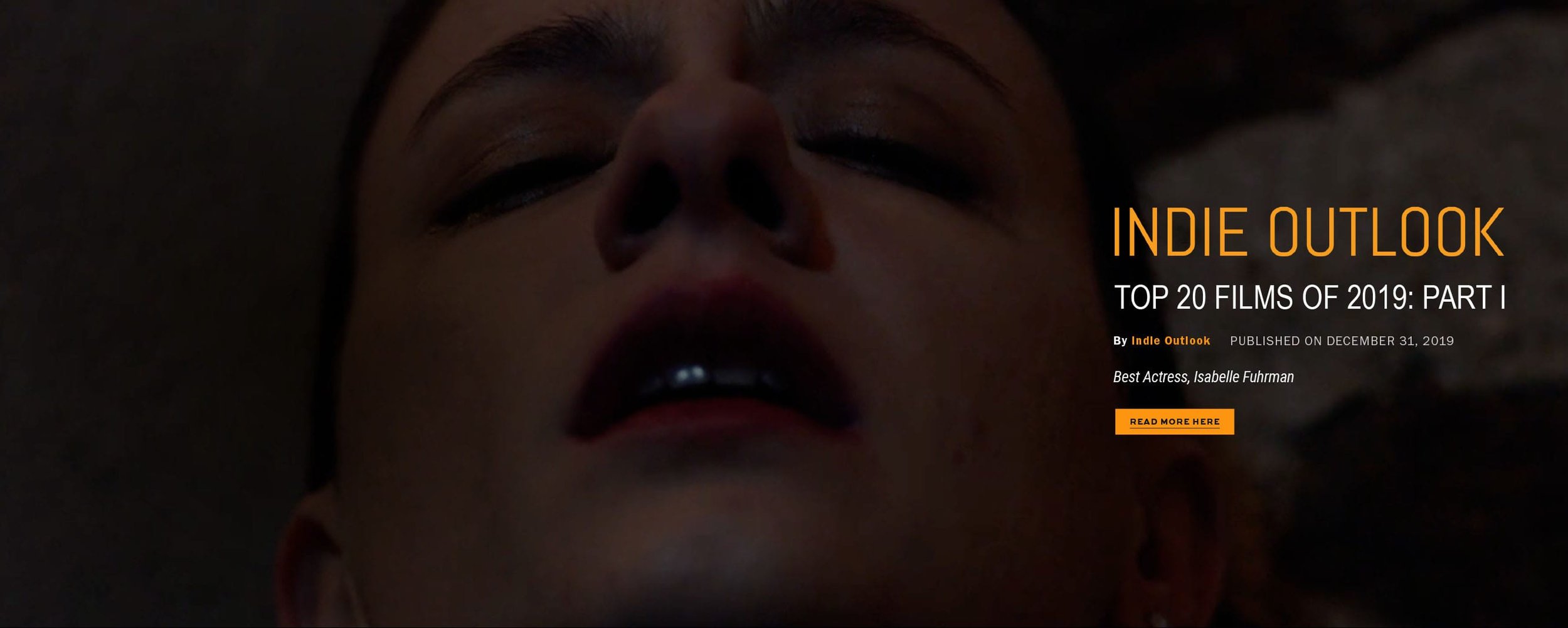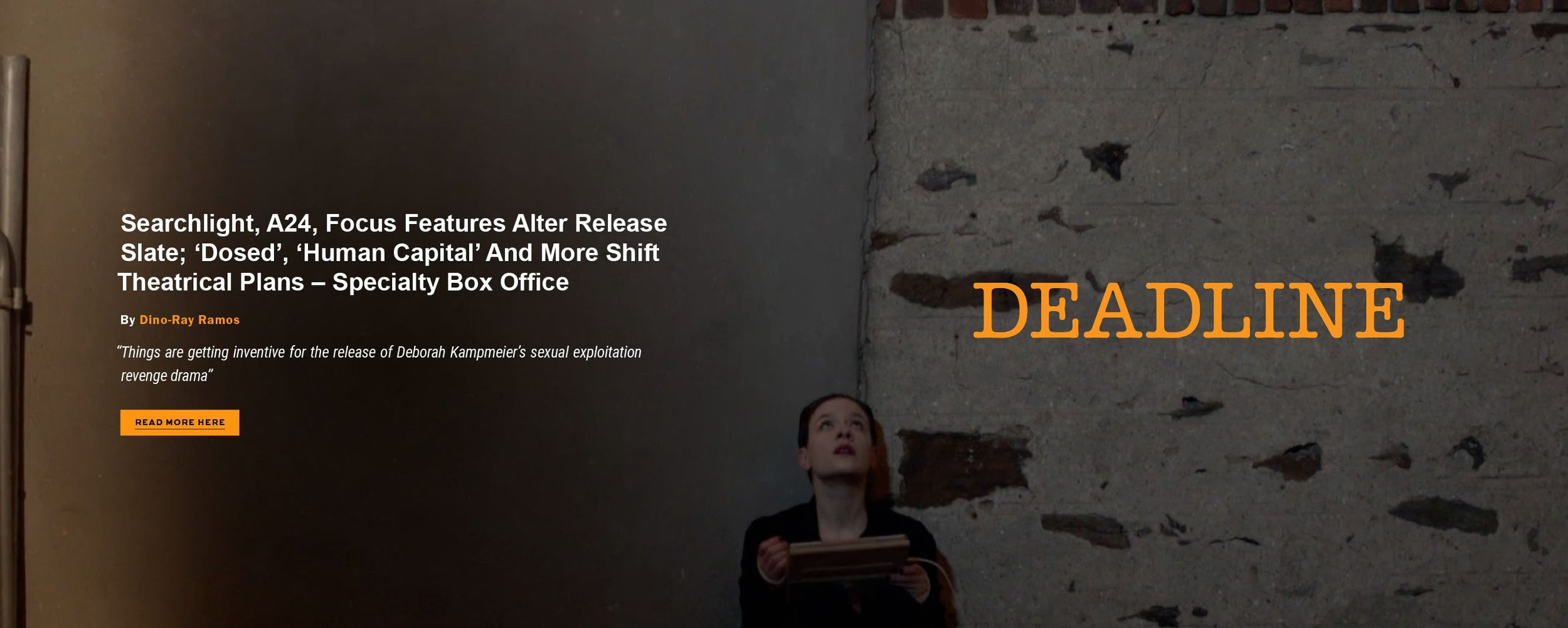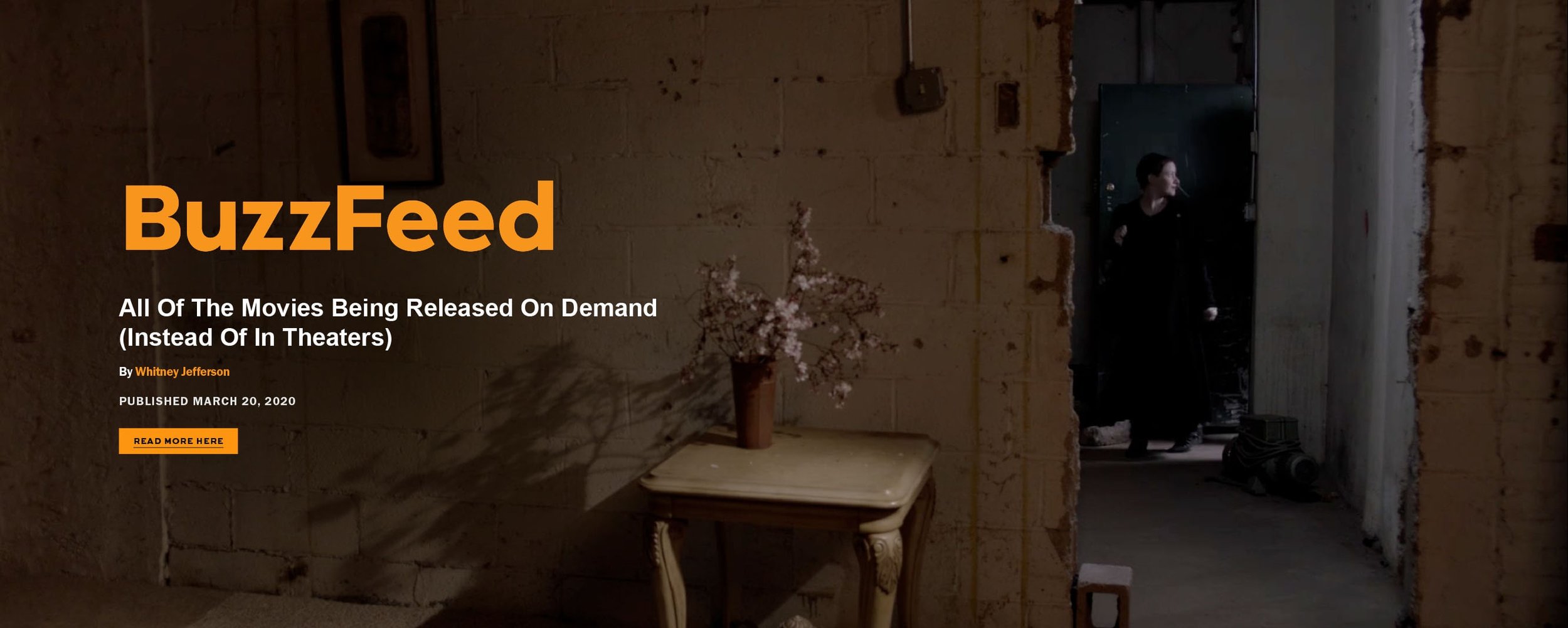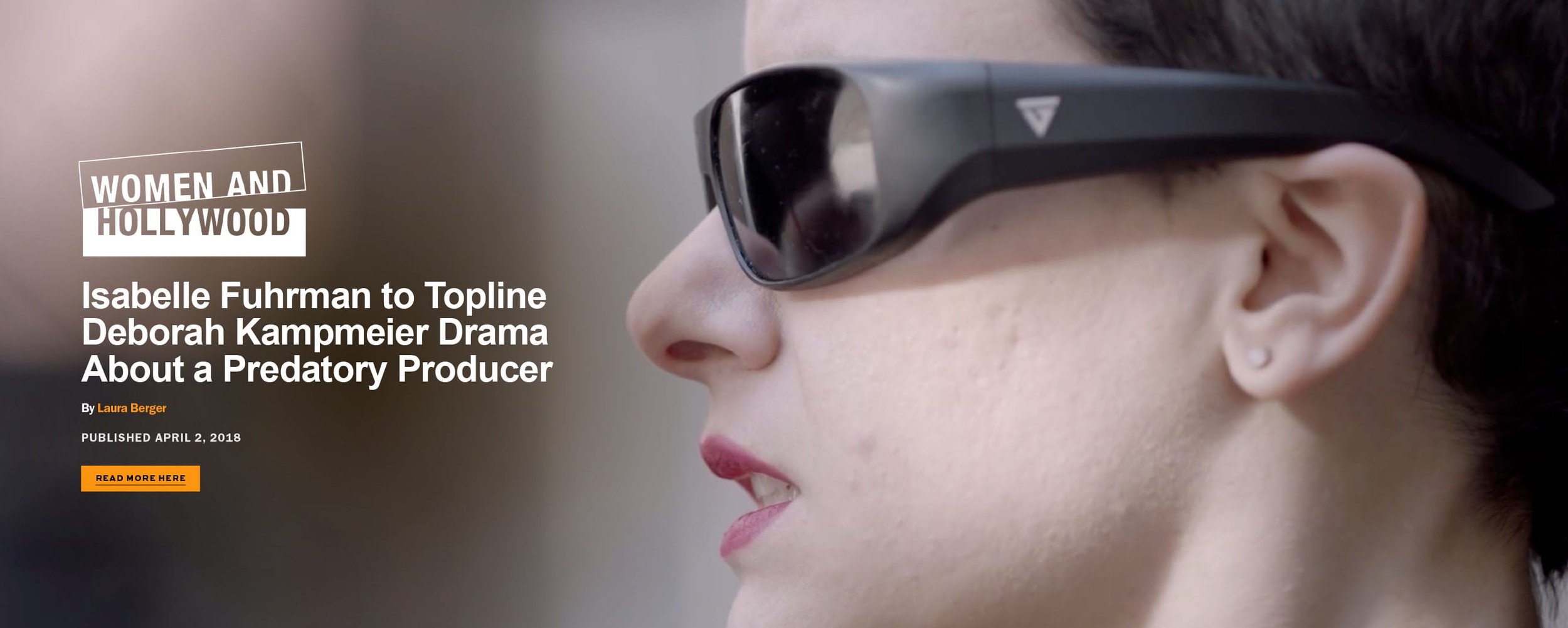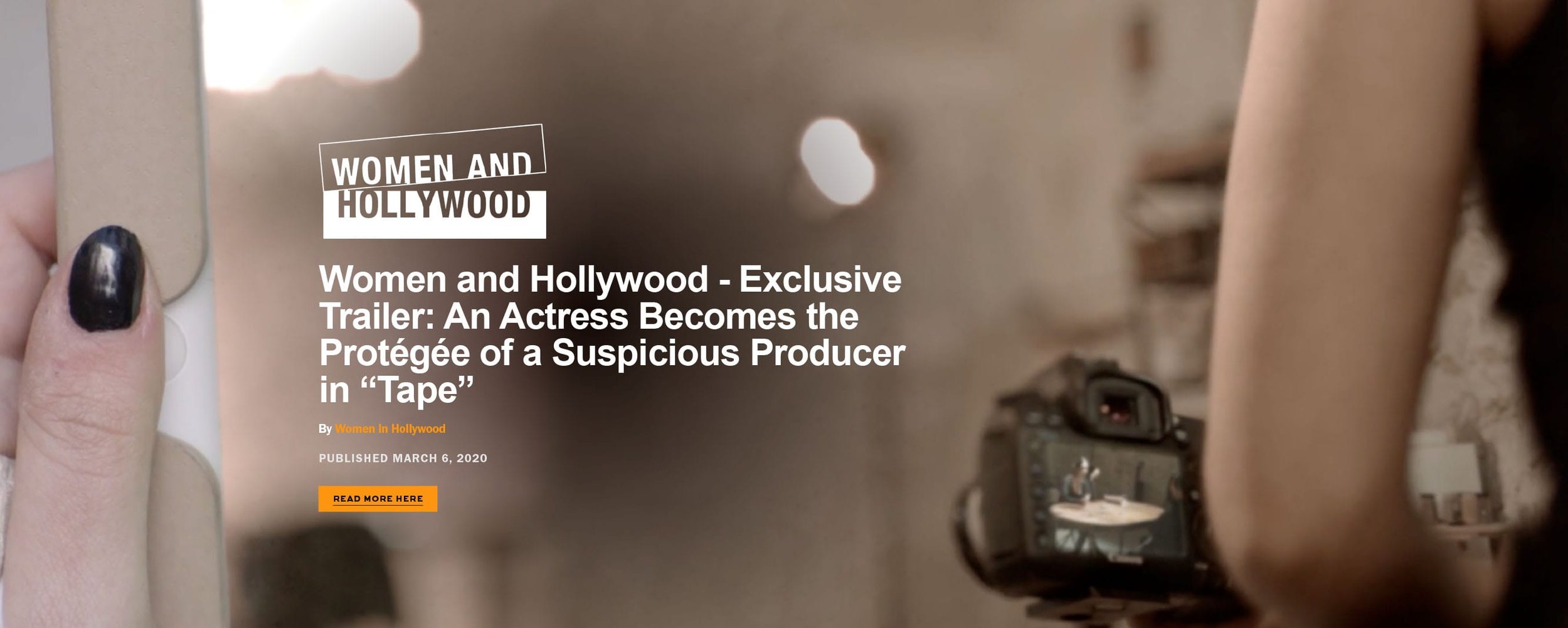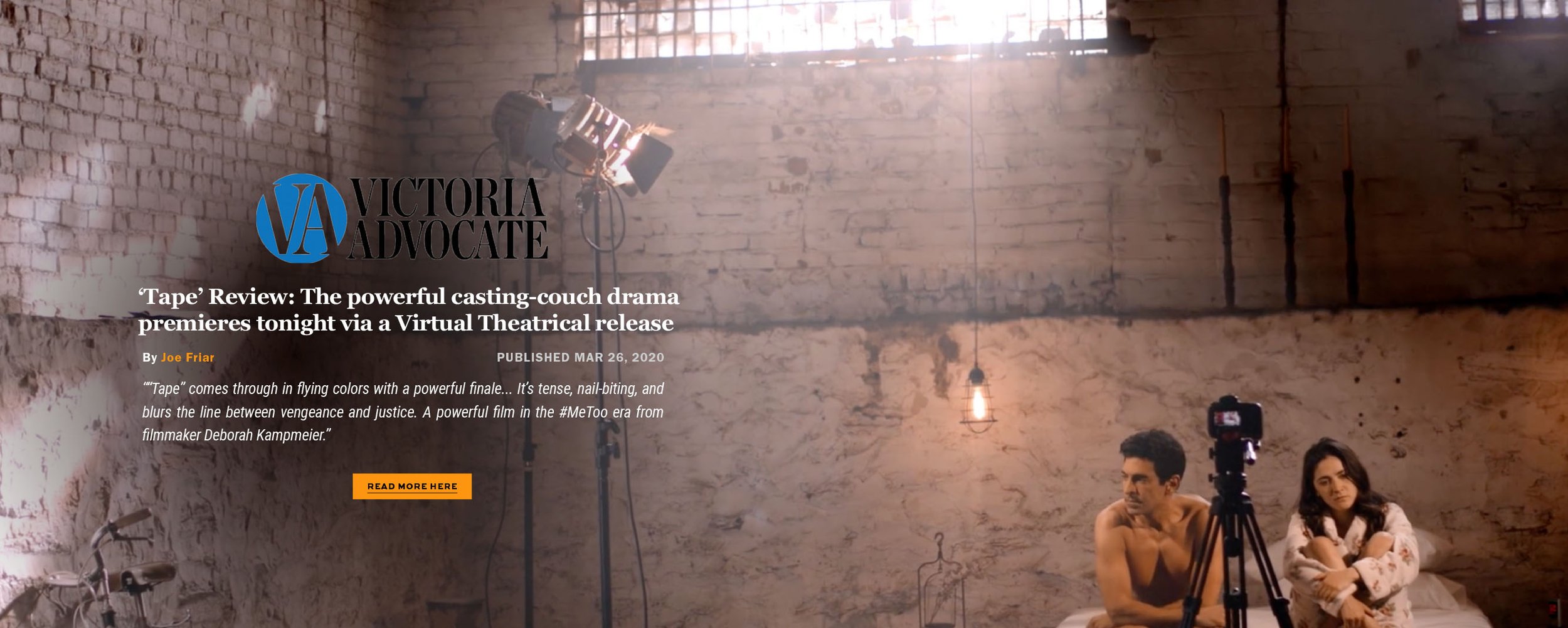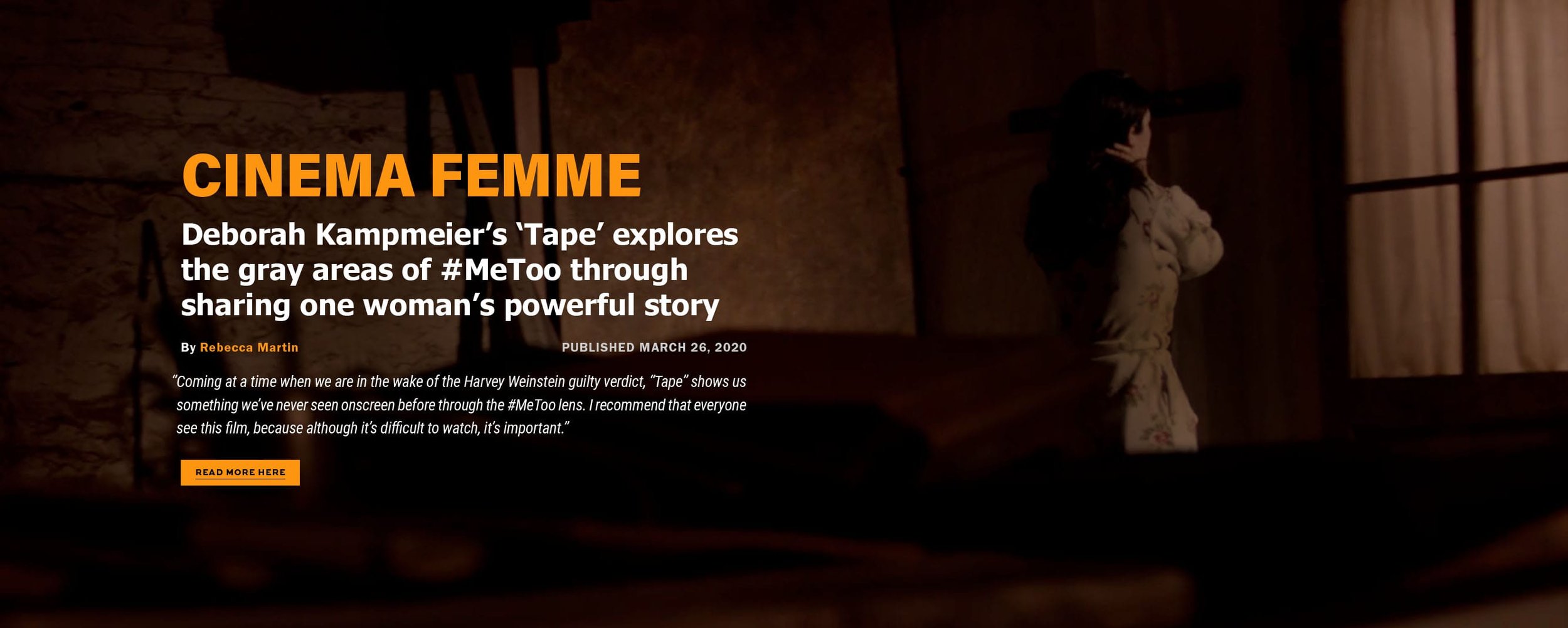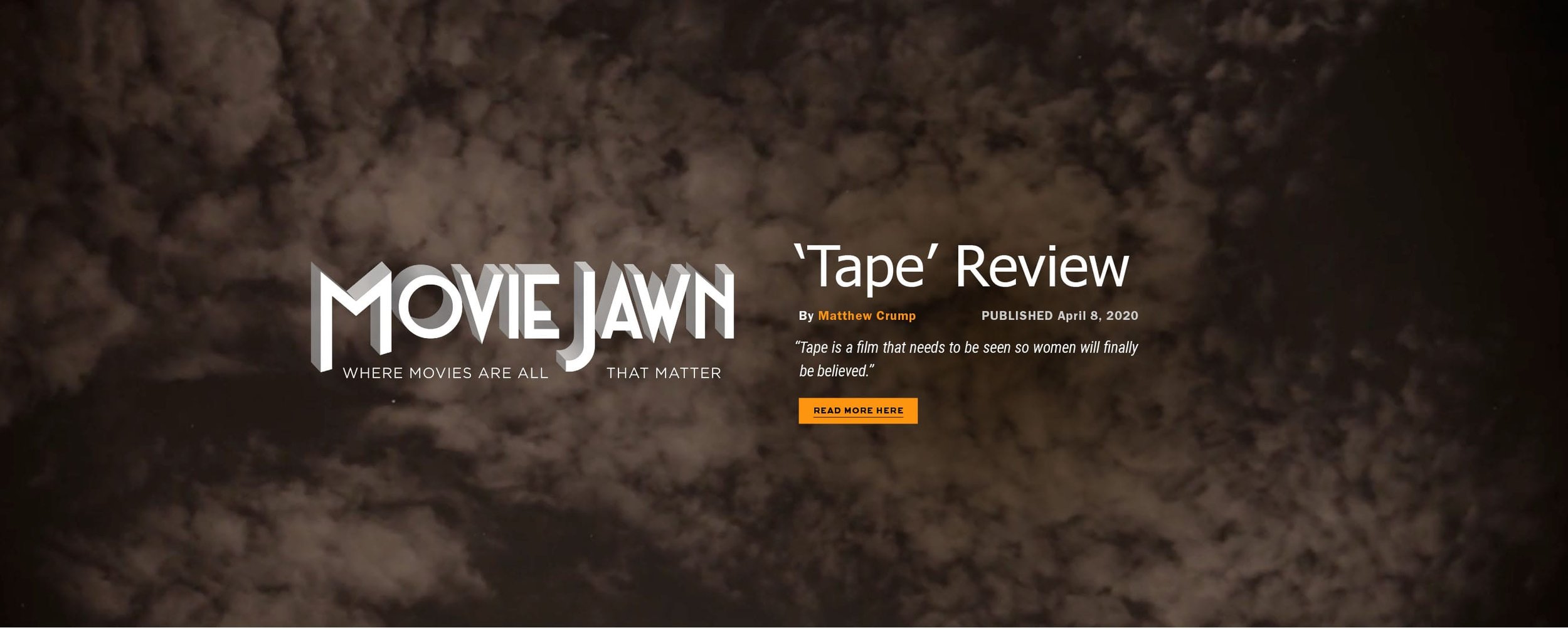Tape 2020
Written and directed by Deborah Kampmeier,
TAPE premiered at the Female Eye Film Festival in Toronto in March of 2020. Its theatrical release was shifted to online due to the pandemic, and featured premiere conversations with Abigail Breslin, Roxane Gay, Debbie Millman, DeMane Davis, and many other filmmakers, writers, and activists.
Synopsis
Based on true events, TAPE, follows Rosa, an actress who, in order to inspire her own courage, pierces her tongue, cuts her wrists, and shaves her head, as a ritualistic homage to Shakespeare’s Lavinia from Titus Andronicus, and secretly places hidden cameras on her body as well as in a dark studio. Rosa begins to stalk another actress, Pearl, who she identifies as the next “protege” of a successful producer, Lux. But as Pearl and Lux enter the targeted studio, and Rosa collects and edits footage, she, and we, must all sit through an endless day of Lux’s screen test process, and the gray areas of pressure that women experience when being coerced by a powerful man. As Rosa peers into her own past experiences playing out before her eyes, she is forced to question whether her revenge-fueled goal of revealing what goes on behind these closed doors is worth what it takes to do so. The film stars Isabelle Fuhrman, Tarek Bishara, and Annarosa Mudd.
Anarosa’s Story
In 2016 Annarosa Mudd joined me as a producing partner with my production company Full Moon Films. We were preparing for the premiere of my third feature, Split. At the same time we had each begun writing screenplays to put into development for the company. As we worked together, Annarosa continuously struggled to write, so I pushed to uncover her block. In the process, Annarosa revealed her fear that if her career were to launch into the public eye a TAPE might surface. I said, “tell me more.” As Annarosa’s story poured out of her, she revealed a haunting tale that hovered in the gray area of sexual abuse broadening its definition to include coercion . This was prior to the #MeToo and #TimesUp movements and so there was no hashtag and no community to attach to her story. However, I felt again the fierce dedication to telling women’s truths, as her story resonated personally with me. And as it aligned with my three previous films, exploring sexual violence against women, I advised Annarosa to speak with a therapist and asked if, after doing so, she would consider honoring me with the task of making a film of her story.
Annarosa proceeded to find a therapist and dig deep into her truth. After three months we reconvened, and together we decided to take Annarosa’s story back from her perpetrator’s gaze and turn it into a revelation of her own experience and truth in the form of a film. TAPE.
I began my dive into writing the screenplay by asking Annarosa what she hoped would happen to her perpetrator. “I want him publicly humiliated and I want him to suffer,” she recalled. I was struck by the fury in Annarosa’s revenge fantasy and decided to write this into the character of Rosa, a role that she herself could play, as a path of reclamation, of “taking her shit and turning it into gold”, a phrase I use frequently to describe my own transmutations in all of my semi-autobiographical work. I then created the character of Pearl (Isabelle Fuhrman), a role that could reflect, word by word and step by step exactly the experience that Annarosa had endured, but a role she would hand off to someone else to play. In addition to one long recorded interview, in which Annarosa retold her story, I also referred to a series of over two dozen email exchanges between Annarosa and her perpetrator, who I named Lux (Tarek Bishara). In the email exchanges is an audition script, an Oil of Olay infomercial, and other instructions, all of which I included in the screenplay.
Selling Women is an Act of Violence
“Oh and, can you put a little nod to Lavinia, from Titus Andronicus, in there as well?”Annarosa added. Her intuition was spot on. As it turned out Shakespeare’s Lavinia and the image of her tongue cut out, so she could not speak of her rape, and her hands cut off, so she couldn’t write of it either, became a central symbol for me in TAPE and a metaphor for the silencing of a woman’s voice after an act of violence or coercion. This story has been going on forever, since the beginning of patriarchy. Shakespeare wrote about it. This is not a new story by any means. And oftentimes the silencing can be as damaging as the act itself. Reclaiming and sharing your own story is a brave, political and healing act. It explodes the patriarchal gaze and formula, catalyzes change, and creates space to amplify more of our stories. I feel this conviction passionately, and it propelled me into work on the script for TAPE around the clock. I finished it in five days. “The experience of reading the script for the first time was exhilarating,” exclaimed Annarosa. “I felt electrified, like it was changing me on a chemical level. I suddenly could move differently through the world. Like I was once a blur and now I could show up boldly and clearly, and see myself that way too.”
A Me Too Film Before #MeToo
With the completed script in hand, and knowing the challenges to get a story like this told, we decided to shoot the film on a very low budget. To our surprise we quickly found an investor and moved immediately into pre-production. Unfortunately during the first week of prep the financing fell through and the production was stalled...for two years. It was only after the news of Harvey Weinstein broke, and the #MeToo and #TimesUp movements began, were we able to bring on another investor—Kenneth Romanski. “I remember being on my tractor clearing snow when I got the call from Annarosa, a long-time family friend. I had been reading all of the news stories about Weinstein and I couldn’t understand how this coercion could happen to so many women. When Annarosa told me about the film and the story she was trying to tell it was the answer to my question, and I felt others needed to know as well,” said Romanski. He spoke to his wife Marie, and the two decided to finance the film, and share this visceral moment-by-moment unveiling of the way ambitious and everyday women are systematically coerced and taken advantage of.
The Gray Are of #MeToo
With financing secured, I brought on producer, Veronica Nickel, who was already in development with several of Full Moon Film’s projects. “I have been a fan of Deborah’s work for a long time. And TAPE was an opportunity to work with her on a smaller scale before our big project,” said Nickel. TAPE was shot in 12 days, “So more than anything this was a labor of love. It was critical content told from a point of view that has not been explored, and by a director whose life’s work is looking at violence against women. It was a perfect storm of creating a disruptor in the status quo. It’s about disrupting the norm,” she continued. “As a society, we haven’t yet addressed the overlooked, but equally serious, crime of coercion,” Nickel said. “In our black and white ‘perfect-victims-only’ society, this is the next frontier of #MeToo and #TimesUp. We urgently need films like TAPE—to help us explore and unpack the gray area.”
Shifting from the Make Gaze to the Female Experience
A recent study cited that 94% of women in Hollywood have experienced sexual abuse, with 21% reporting being forced to perform a sexual act. The story of TAPE follows two aspiring actresses, but women across all industries and walks of life can see themselves in the film, as these are not celebrities, rather they are women with big dreams and ambitions who are not in a position of power. In our culture, we largely reject such stories, so they lie suppressed and hidden in women’s minds and bodies. My interest in and efforts to find a cinematic language that shifts from the male gaze to the female experience are captured in TAPE with a tilt shift lens to create the effect of a hidden camera that is searching for that female experience throughout the beginning of the film. As viscerally experienced by a difficulty in finding focus, it is clear how difficult it is to know, find, and capture the female experience. However, the payoff at the end of TAPE is worth the uncertainty of the search.
From Isolation to Connection
In the process of trying to meet the male gaze we perform instead of experience our lives. The training by the male gaze causes women to turn away from their instincts and intuition, cutting off parts of themselves, like their hands and their tongues, their rage, grief, pain, sexuality and truth. TAPE was not made to be a #MeToo and #TimesUp movie, or a political statement. I wanted to honor my friend and colleague, Annarosa Mudd’s experience, which is fully articulated in the film. It certainly coincides with the #MeToo and #TimesUp movements, but rather than being black and white, TAPE explores the gray areas. And doesn't hold back from showing how brutal things really are.
We are fucking pissed. That women are systematically silenced and manipulated. That the best of who we are - our passion and ambition - is weaponized against us. Annarosa told me, “The way Isabelle works is so fluid and deep, and watching her in the scenes as she was ‘making the decision’ was mind blowing. I told her that she made me feel less stupid. As I watched her, I saw a story, a smart person trying to work her way through something. Seeing it that way helped me to stop berating myself, stop seeing myself as gullible, stupid, an easy mark,” She continued, “The film pulls focus to the grey area of sexual abuse and we hope will move women’s experience from a place of secrecy and isolation to one of visibility and empowered connection.”
What Happens Behind Closed Doors
Society hasn’t been brave enough to stare down the truth of the female experience. TAPE dares its audience to rise to the occasion - to stop dancing around the subject and sit through the experience. TAPE was created to take back the power that Annarosa's perpetrator's tape had over her. It had paralyzed her. Through making this film her perpetrator's gaze is now powerless and her experience has become meaningful. In telling and claiming her experience she hopes to make space for more women to share their stories. And in standing by her truth she delivers a call-to-action to men to shoulder this burden with us. This film is a catalyst for society to face and transmute our collective and individual trauma, encouraging us to move from isolation to connection.
https://www.amazon.com/Tape-Isabelle-Fuhrman/dp/B089VCQVFL
















